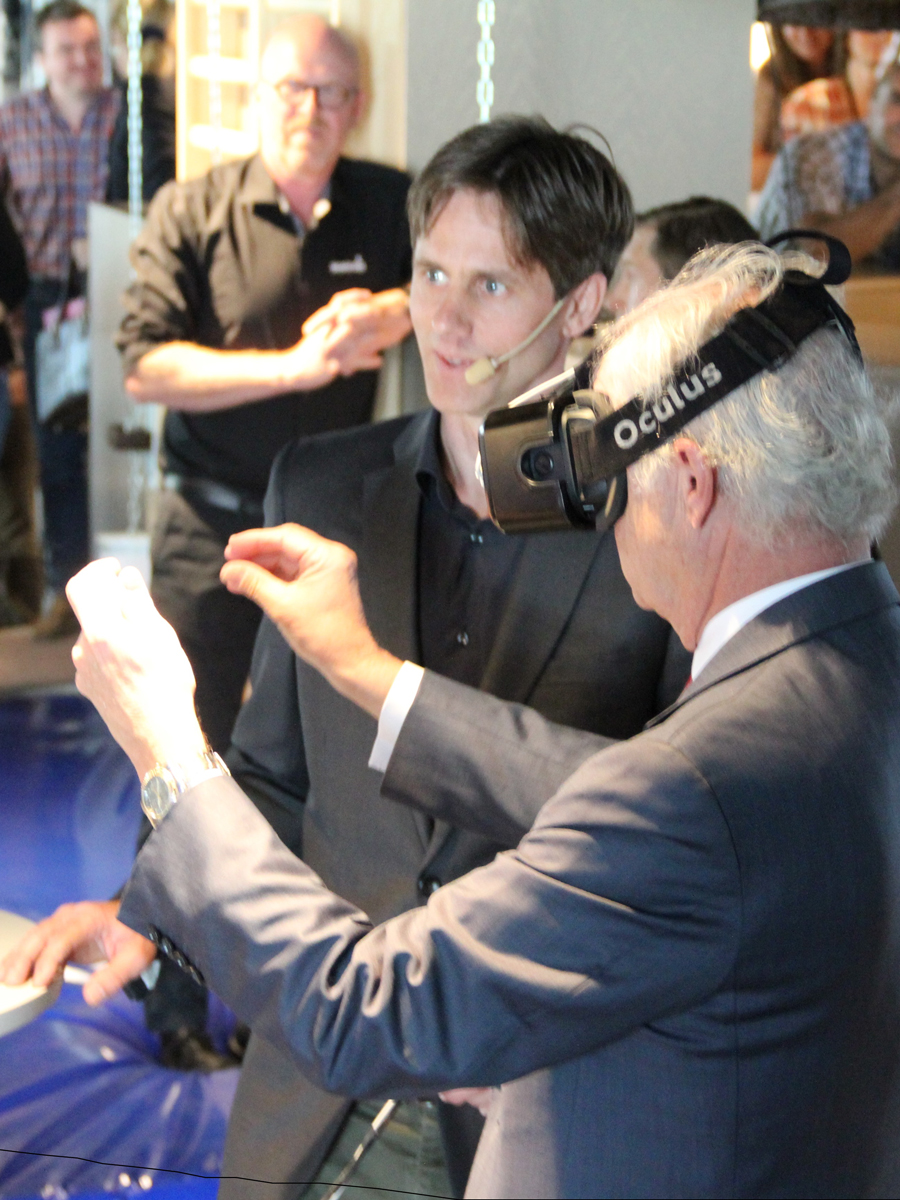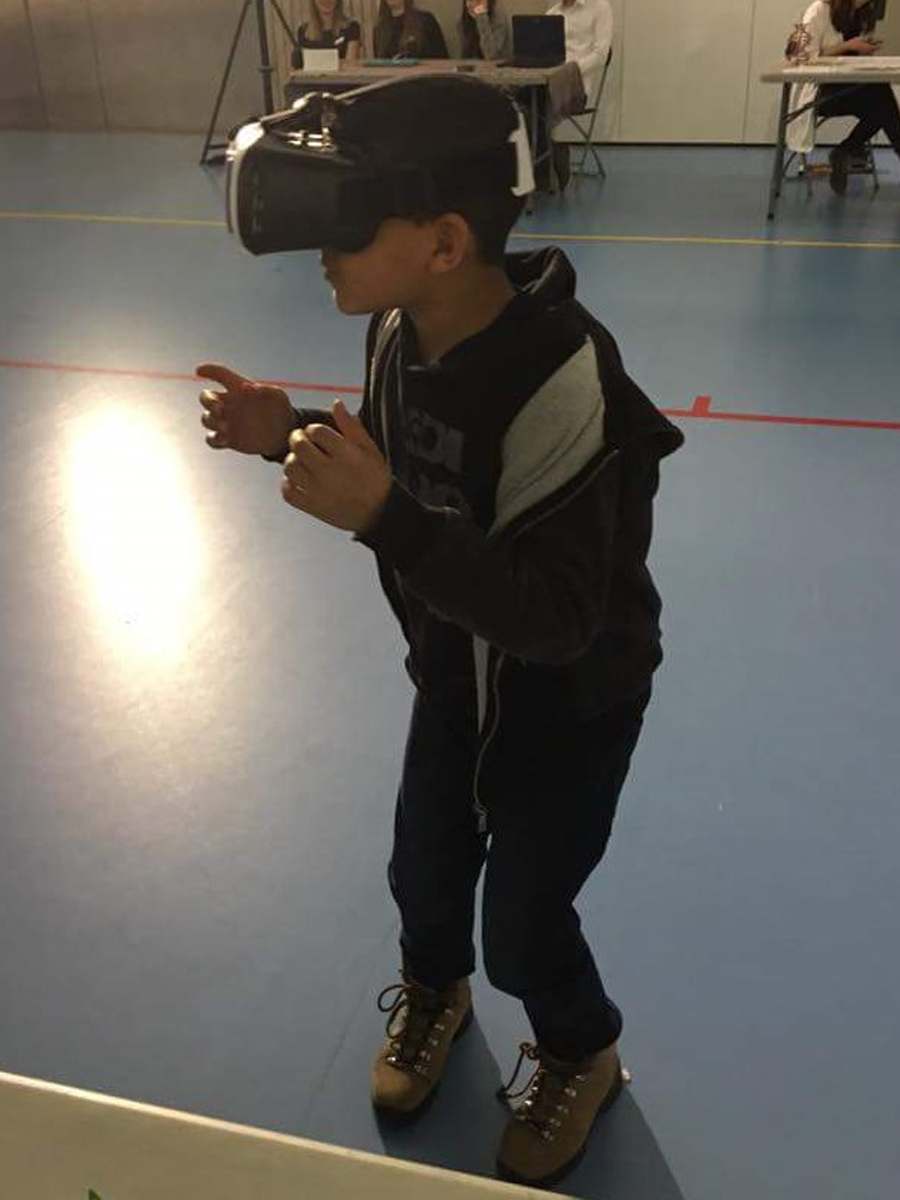Can virtual reality make chemistry the coolest school subject?

School children inspiring molecules in virtual reality at a Science Festival Picture: © Jonas Boström
Jonas Boström, whose day job is in computational chemistry at AstraZeneca, along with former student Magnus Norrby, recently started a company called EduChem VR. They aim to increase comments like “wow, this cool!” in chemistry education.
Twenty years ago when I studied chemistry at the University of Gothenburg in Sweden, the lecture halls were full of students. Today they echo empty. Chemistry is often seen as dull and dry… and difficult to understand.
In an attempt to reverse that trend, and to engage students and inspire further studies we set out to produce virtual reality (VR) apps for chemistry education. Apps that can be used with todays’ kids’ favorite toy – their smartphone.

Jonas Boström met the King of Sweden, making him a local celebrity at AstraZeneca overnight Picture: © Jonas Boström
It started 3 years ago, when talented computer science student Magnus Norrby asked to do his Masters thesis with me using something called Oculus Rift. Six months later we had built a VR molecular visualizer from scratch, good enough for AstraZeneca to highlight at a state visit by the King of Sweden.
The work was published (Molecular Rift), the code was made open-source and we thought that was it. Magnus left to work as a programmer, in Finance, in another city. However, we both kept watching the VR field develop, and observed the rapid and impressive progress in mobile VR.
By using simple Google Cardboards anyone could be reached anywhere by using smartphones – from VR enthusiasts in the western world to school kids in developing countries. Very cool we both thought, and a few months later we co-founded EduChem VR. In this context it should be noted that Molecular Rift requires specialist hardware whilst mobile VR can be run on your smartphone.
Why virtual reality then? Apart from being very cool, virtual reality has proven ideal to increase interest and understanding. For example, when you put a person in a place they are more likely to remember it. And compare trying to make a (perhaps unmotivated) student read a book, by teleporting him/her into a new virtual world.

School children inspiring molecules in virtual reality at a Science Festival Picture: © Jonas Boström
So instead of starting a lecture with the phrase "everyone turn-off your phone now", we aim for the opposite! The digitalization era is here, and we really should embrace it. A lot of chemistry can be done in the computer nowadays.
All molecules are 3D objects, thus making it perfect for VR. The way chemistry is taught today is usually with pen-and-paper/whiteboard... or using physical models, which is rather limiting and can be tedious to set up.
As an illustrative example, the stereochemistry concept is often as difficult to understand as it is to describe. In brief, many molecules have mirror images. These mirror images have the same molecular formula and connectivity of atoms but a different arrangement of atoms in space. They are thus not the same, and are non-superimposable. Just like your left and right-hand.
Proteins can often distinguish between these mirror images, and many chemical reactions favors the formation of one mirror image, a specific stereoisomer. This is an important concept which is difficult to explain using traditional methods.
You can see how I struggle to describe it with words. Imagine being able to shrink students and let them fly around stereoisomers and experience molecules in a virtual reality while being amazed by the feeling of presence! It does sound efficient, engaging and useful, right?
Ever since my mom bought not one but two(!) Commodore 64’s in the beginning of the eighties (and I started to program in BASIC), I’ve loved working with computers. I still get amazed when the stuff I code up actually does what I want. The feeling is great, and being able to put a smile on a kid’s face and hear “wow, this is cool!” - while they perhaps unintentionally learn some chemistry - is awesome!
The first three freemium apps can be downloaded from our website, one to explore different carbons forms, or allotropes, one to help explain the concept of stereochemistry, and one to explore macromolecular structures – by going on a DNA roller-coaster!
In addition to mobile VR apps, EduChem VR dabble around in basically all VR platforms. Try them out, give us feedback, sign up for our pilots and help us make chemistry the coolest school subject.
Find out more
The EduChem VR company was launched at the Royal Society of Chemistry’s 'Chemistry on Mobile Devices' event in Cambridge last year. Read more about the meeting here.
If you’re interested in EduChem VR Sweden you can find out more on their webpage, Facebook page, or Twitter account.